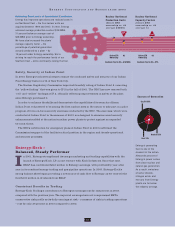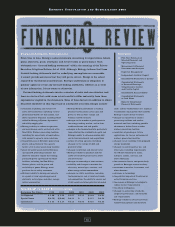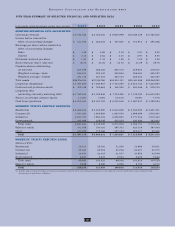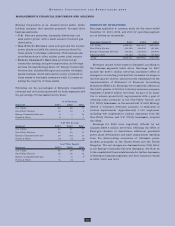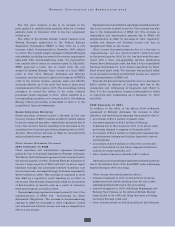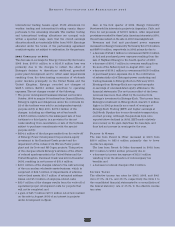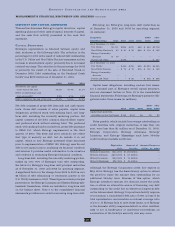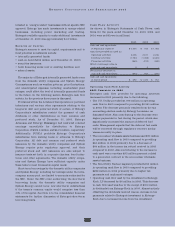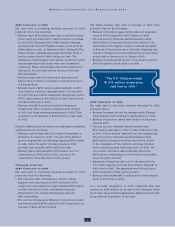Entergy 2003 Annual Report Download - page 27
Download and view the complete annual report
Please find page 27 of the 2003 Entergy annual report below. You can navigate through the pages in the report by either clicking on the pages listed below, or by using the keyword search tool below to find specific information within the annual report.
25
ENTERGY CORPORATION AND SUBSIDIARIES 2003
The fuel price variance is due to an increase in the
price applied to unbilled sales partially offset by a revised
estimate made in December 2002 to the fuel component
of that price
The effect of the System Energy refund resulted from
System Energy’s application to the Federal Energy
Regulatory Commission (FERC) in May 1995 for a rate
increase, which it implemented in December 1995, subject
to refund. The request sought changes to System Energy’s
rate schedule, including increases in the revenue requirement
associated with decommissioning costs, the depreciation
rate, and the rate of return on common equity. In July 2000,
FERC approved a lower rate of return than the rate
sought by System Energy. Upon receipt of a final FERC
order in July 2001, Entergy Arkansas and Entergy
Louisiana recorded entries to spread the impacts of FERC’s
order to the various revenue, expense, asset, and liability
accounts affected, as if the order had been in place since
commencement of the case in 1995. The accounting entries
necessary to record the effects of the order reduced
purchased power expenses in 2001, which resulted in a
corresponding increase in net revenue in 2001. The System
Energy refund proceeding is discussed in Note 2 to the
consolidated financial statements.
GROSS OPERATING REVENUES
Gross operating revenues include a decrease in fuel cost
recovery revenue of $897.4 million and $60.5 million related
to electric sales and gas sales, respectively, primarily due to
lower fuel recovery factors resulting from decreases in the
market prices of natural gas and purchased power in 2002.
As such, this revenue decrease is offset by decreased fuel
and purchased power expenses.
Other Income Statement Variances
2003 COMPARED TO 2002
Other operation and maintenance expenses decreased
primarily due to decreased expenses at Entergy Arkansas.
The March 2002 settlement agreement that became final in
the second quarter of 2002, allowing Entergy Arkansas to
recover a large majority of 2000 and 2001 ice storm repair
expenses through the previously-collected transition cost
account amounts, increased Entergy Arkansas’ expenses by
$159.9 million in 2002. This increase in expenses in 2002
was offset by a regulatory credit resulting in no effect on
net income. The decrease was partially offset by an increase
of $99.8 million in benefit costs as a result of voluntary
severance program accruals in 2003.
Decommissioning expense increased primarily due to the
implementation of SFAS 143, “Accounting for Asset
Retirement Obligations.” The increase in decommissioning
expense is offset by increases in other regulatory credits
and interest and dividend income and has an insignificant
effect on net income.
Depreciation and amortization expenses increased primarily
due to an increase in plant in service. The increase was also
due to the implementation of SFAS 143. The increase in
depreciation and amortization expense due to SFAS 143
implementation is offset by increases in other regulatory
credits and interest and dividend income and has an
insignificant effect on net income.
Other income decreased primarily due to a decrease in
“miscellaneous – net” as a result of a $107.7 million accrual
in the second quarter 2003 for the loss that would be asso-
ciated with a final, non-appealable decision disallowing
abeyed River Bend plant costs. See Note 2 to the consolidated
financial statements for more details regarding the River
Bend abeyed plant costs. The decrease was partially offset
by an increase in interest and dividend income as a result of
the implementation of SFAS 143.
Interest charges decreased primarily due to a decrease of
$28.5 million in interest on long-term debt due to the
redemption and refinancing of long-term debt. Refer to
Note 5 to the consolidated financial statements for detail
of long-term debt outstanding as of December 31, 2003
and 2002.
2002 COMPARED TO 2001
In addition to the effect of the March 2002 settlement
agreement at Entergy Arkansas, the increase in other
operation and maintenance expenses was primarily due to:
an increase of $51.2 million in benefit costs;
increased expenses of $24.5 million at Entergy
Arkansas due to the reversal in 2001 of ice storm costs
previously charged to expense in December 2000;
an increase of $14.6 million in fossil plant expenses due
to maintenance outages and turbine inspection costs at
various plants;
an increase of $10.9 million to reflect the current esti-
mate of the liability for the future disposal of low-level
radioactive waste materials; and
lower nuclear insurance refunds of $6.7 million.
Depreciation and amortization expenses increased primarily
due to the effects in 2001 of the final FERC order addressing
System Energy’s 1995 rate filing.
Other income decreased primarily due to:
interest recognized in 2001 on Grand Gulf 1’s decom-
missioning trust funds resulting from the final order
addressing System Energy’s rate proceeding;
interest recognized in 2001 at Entergy Mississippi and
Entergy New Orleans on the deferred System Energy
costs related to its 1995 rate filing that were not being
recovered through rates; and
lower interest earned on declining deferred fuel balances.




